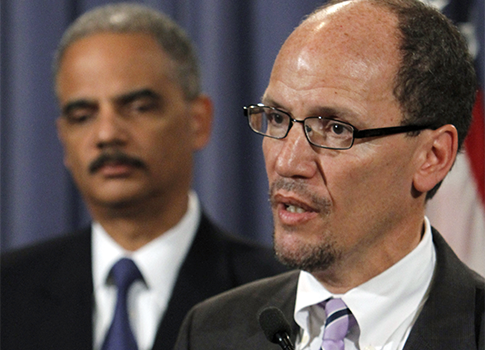President Barack Obama’s rumored pick for labor secretary defended race-based criteria for pursuing cases and provided incomplete information to a Department of Justice inspector general investigation, according to a report released Tuesday.
As head of the Civil Rights Division of the Department of Justice since June 2009, Tom Perez was part of an investigation on politicized conduct within the Civil Rights Division’s Voting Section.
The inspector general’s report claimed that, during testimony before the U.S. Commission on Civil Rights:
AAG Perez testified … that political leadership in the Department was not ‘involved’ in the decision to dismiss three of the four defendants from the NBPP case.
However, investigators found that at least two political appointees were involved in the process:
Perez’s characterization omitted the Associate Attorney General Perrelli and Deputy Associate Attorney General Hirsch were involved in consultations about the decision.
Perez defended his initial statement, claiming what happened did not constitute involvement. However, the inspector general’s report disagreed with Perez’s defense:
We believe that these facts evidence ‘involvement’ in the decision by political appointees within the ordinary meaning of the word.
Perez revealed to investigators that he saw the Voting Rights Act as only providing protection to specific, historic minorities, not all citizens:
CRT AAG Perez stated that interpreting Section 5’s retrogressive-effects standard to not cover White citizens was consistent with the Division’s longstanding practice, as well as case law interpreting the provision and the intent behind its enactment… Perez noted that the Division has always understood the term ‘minority’ to mean not numerical minority but rather ‘an identifiable and specially disadvantaged group.
Perez defended unequal protection to investigators as a practical matter:
According to Perez, applying Section 5’s retrogressive-effect protections to White citizens would create ‘dramatic complications’ … noting that ‘many voting changes … will almost always have some racial effect in some direction,’ and if the retrogressive-effect standard protects everyone, then virtually no proposed voting changes would ever be approved.
Perez further defended unequal protection by claiming:
To not cover White citizens was consistent with the Division’s longstanding practice.
Yet three former Assistant Attorney Generals from the previous administration disputed Perez’s interpretation of division practices:
At Least three AAGs from the previous administration told the OIG that Division leadership at that time did not have a policy to interpret Section 5’s retrogressive-effect prong such that it would not cover White Citizens.
Perez is not alone in believing the Voting Rights Act provides unequal protection. Career employees and managers in Perez’s division also objected to cases with white victims. None of them disputed that the text of the law was race-neutral and applied to all races, but they believed the Voting Section should not pursue cases where victims were white because it was a misallocation of resources:
Some of these individuals, including one current manager, admitted to us that, while they believed that the text of the Voting Rights Act is race-neutral and applied to all races, they did not believe the Voting Section should pursue cases on behalf of White victims.
Investigators found that emails revealed widespread and vehement opposition to a specific case because the defendants were black.
Indeed, our review of Voting Section e-mails revealed widespread and vehement opposition among career employees to the prosecution of the Noxubee matter precisely because the defendants were black.
Two career employees admitted to investigators that even if they had infinite resources they wouldn’t support cases with white victims and black defendants.
Two career Voting Section attorneys told us that even if the Department had infinite resources, they still would not have supported the filing of the Noxubee case because it was contrary to the purpose of the Voting Rights Act.
